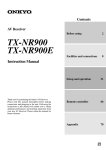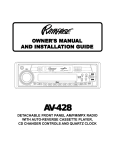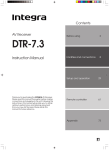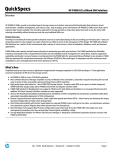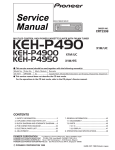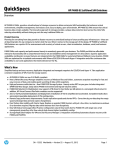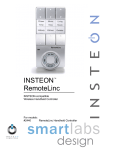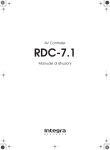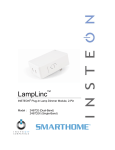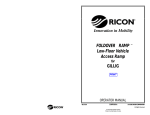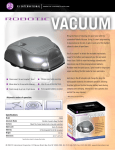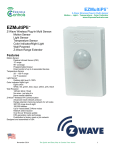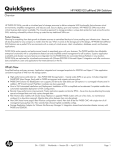Download Onkyo Radio TX-NR900 User's Manual
Transcript
TX-NR900/TX-NR900E How to Enjoy Net Audio Features System Requirements The TX-NR900/900E is a network audio client that is connected via a LAN to a PC and allows you to enjoy music files saved on the PC, as well as Internet radio, from anywhere in your home. Requirements for listening to both Internet radio stations and music files saved on the music server Internet radio features The TX-NR900/900E provides enhanced support for Internet radio and allows you to: • Listen to both WMA and MP3 audio streamed from Internet radio stations • Select stations by genre, location, or language • Preset up to 30 Internet radio stations Net-Tune Features The Net-Tune Central is software which distributes music files stored on PC through LAN to the TX-NR900/900E. The TX-NR900/900E plays distributed music data whenever you need. * This software is available from Onkyo’s web US → http://www.onkyousa.com/net-tune/ Europe → http://www.onkyo.net/net-tune Japan → http://www.onkyo.co.jp/ Asia, Oceania, and Central and South America → http://www.onkyo-intl.com/ In the connection between the Net-Tune Central and the TX-NR900/ 900E, the standard TCP/IP network protocol and the Onkyo’s proprietary NTSP protocol is used for music distribution through LAN. The NTSP protocol handles not only data for music itself but also additional music information including the name of tracks and artists, enabling high usability. In addition to the music distribution server function, the Net-Tune Central can automatically retrieve the music files stored on PC to register them easily with the Net-Tune Central database. The Net-Tune Central supports WAVE (PCM), MP3 and WMA formats. The WAVE format has high sound quality (equivalent to CD) with no compression. The MP3 format is widely used through Internet environment and has near-CD quality with compression. The WMA format is developed by Microsoft® has also near-CD quality using higher compression rate. ■ Modem (a device that provides Internet connections via leased lines; e.g., a cable modem, xDSL modem, terminal adapter) * To have access to Internet, you typically need to make a contract with an Internet service provider (ISP). Modem requirements differ from ISP to ISP; for detailed information, consult with your ISP or PC retailer. ■ Router (gateway) (a device that enables multiple PCs or devices to connect to the Internet simultaneously) An IP address can be obtained automatically by using the router’s DHCP function. * Some routers have built-in modem functionality. Router requirements differ from ISP to ISP; for detailed information, consult with your ISP or PC retailer. ■ Ethernet CAT-5 cable ■ Minimum Internet Connection Requirements: • Broadband Internet Connection • DHCP (Dynamic Host Configuration Protocol) based network (requires a DHCP-enabled router) • 100Base-TX switch built-in broadband router (recommended) ■ Minimum PC System Requirements: 600 MHz Intel Pentium III CPU or better, Windows 98SE, Me, XP, or 2000 OS (operating system), more than 20 MB of free hard disk space, RAM (Windows 98SE, Me, 2000; requires 128 MB, XP; requires 256 MB) and Ethernet port. Not compatible with Macintosh systems. Notes: • If your ISP contract assumes manual configuration of network settings, you need to manually configure your network settings as described in “Network Setup Menu” (see page 6). • The TX-NR900/900E does not support network settings for PPPoE connections; if your ISP contract requires PPPoE, therefore, you must have a gateway/router with PPPoE support. Editable music library • You may have to set up a proxy server to listen to Internet radio, depending on the ISP you choose. If your PC is configured to use a proxy server for Internet access, the TX-NR900/900E must also be configured the same way. For more information, see “5-2. Proxy Setup Sub-menu” (see page 7). With the Net-Tune Central software, you can edit music titles, artist names, genre names, and so on, while you can also create new genre names, for all music files saved on the PC’s hard disks. The Net-Tune Central also provides this information with the TX-NR900/ 900E, allowing you to select tracks easier on the TX-NR900/900E. • The TX-NR900/900E is designed to take advantage of the DHCP and AutoIP functionality, thereby automatically configuring the network settings. If you opt not to use the DHCP and AutoIP functionality, you should manually configure the network settings. For more information, see “5-1.IP Address Sub-menu” (see page 7). Hint: File Format: MP3/WMA (Approximately 1 MB for 1 minute) WAVE (Approximately 10 MB for 1 minute) * How much free space is actually required also depends somewhat on such factors as the format and reserved space of your hard disk, and the bit rate at which you make recordings. * Depending on the MP3 encoder you use, your recorded file may not be playable, or can play the music degraded by noise, or can generate uncomfortable sound. Also note that no WMA format file with copyright protection enabled is playable on the TX-NR900/900E. • To enjoy music on Internet Radio, it is assumed that you provide a broadband Internet connection on which you can successfully run a web browser. If you have any problem in connecting to the Internet, consult with your ISP. Connecting the TX-NR900/900E to your Ethernet Network Plug one end of an Ethernet CAT-5 cable into the port on the backside of the TX-NR900/900E and the other end into the gateway. PC Internet LAN port/ Ethernet, etc COMPONENT VIDEO Modem SURR SPEAKERS FRONT SPEAKERS OUTPUT Y R R L L AC OUTLETS PB AC 120 V 60 Hz SWITCHED TOTAL 120W 1A MAX. PR INPUT 1 To the WAN side Y ETHERNET [NET-TUNE] PB PR To the LAN side port INPUT 2 Y CAUTION: SPEAKER IMPEDANCE SURR BACK/ ZONE 2 SPEAKERS CENTER SPEAKER 4 OHMS MIN. OR 6 OHMS MIN. /SPEAKER SEE INSTRUCTION MANUAL FOR CORRECT SETTINGS. R IR 12V TRIGGER OUT IN ZONE 2 OUT REMOTE CONTROL L AV RECEIVER MODEL NO. TX-NR 900 PB PR To the LAN side port TX-NR900/900E Router Internet radio PC Modem To the WAN side To the LAN side port To the LAN side port To the LAN side port Router Room 1 2 Room 2 Hint: Connecting more than one unit of TX-NR900/900E to a router enables several users to listen to Internet radio at different stations or different music pieces contained in the same library on the PC. Enjoying Music on Internet Radio or PC NET AUDIO NET A SETUP MASTER VOLUME STANDBY/ON ENTER, STANDBY POWER ON DISPLAY OFF PURE AUDIO UPSAMPLING AUDIO SELECTOR ZONE 2 ( GRN ) REC ( RED ) DVD VIDEO 1 VIDEO 2 VCR 1 VCR 2 VIDEO 3 VIDEO 4 VIDEO 5 TAPE TUNER PHONO CD NET AUDIO DISPLAY VIDEO 5 INPUT PHONES REC OUT ZONE 2 OFF STEREO SURROUND THX DSP DIMMER LATE NIGHT Re-EQ SETUP ENTER RETURN ZONE 2 LEVEL DIGITAL S VIDEO VIDEO L AUDIO R RANDOM ALBUM ARTIST REPEAT PLAYLIST GENRE / Alphanumeric keys ENTER * In the NET AUDIO mode, buttons will function according to the associated labels printed in blue. Enjoying Internet radio 7. Press the ENTER button. To listen to Internet radio, the connection/configuration requirements listed on pages 1, 2 must be satisfied. When you perform the step 2 and following steps, use the remote controller. 1. Press the NET AUDIO button (on the main unit) or the NET A button (on the remote controller). Calls the setting used last time. If you want to listen to Internet radio immediately after using Music Server on your PC, you can switch to Internet radio by pressing the same button again. It will take some time until the connection is established. 2. Press the DISPLAY button on the remote controller. 3. Use the / buttons to select one of the main menu; Genres, Location, or Language. To cancel, press the button. 4. Press the ENTER button. Buffering starts with the following message displayed. When the buffering completes, the TX-NR900/900E starts playback of the broadcast. Note: If you are connected to the Internet via a slow link (such as a dial-up connection) rather than a broadband link (via an xDSL or cable modem), you may not be able to enjoy Internet radio as you expect or at all. You can switch the displayed content using the / buttons. After the switch operation, the display mode appears for 3 seconds, and then the appropriate information scrolls. If there is no information on title or artist, “No Info” appears. When using the OSD screen, all the information is displayed on one screen without scrolling. OSD Wait while your requested data is download from the XiVA Internet Radio Service. * What is the XiVA Internet Radio Service? The XiVA Internet Radio Service provides tuning information, allowing you to select from a large number of stations. You can find Internet Radio Stations based on your interests, musical taste, language and location. When Genres is selected: Allow a few moment until the Genre menu appears. When the main list of genre appears, use the / buttons to select a genre as desired. Pressing the ENTER button brings up the sub-list of the genre you selected, which prompts you to further select one of the items using the / buttons. When Location is selected: The list containing names of countries appears. Use the / buttons to select an item as desired. When Language is selected: The list of languages appears. Use the / buttons to select your desired item. iNet Radio Station ONK 7ch Track: Station ONK Live Program: Station ONK Live Artist: RealOnkyoNet.com Data: WMA 20kbps Tuned Display ■ Presetting Internet radio stations: You can preset up to 30 internet radio stations. 1. Receive your desired station. 2. Press the button. The TX-NR900/900E enters into preset mode; the currently selected preset number flickers for 5 seconds. If no list is found, “No List” appears. You can return from this screen to the previous selection screen by pressing the button. Preset number ch 5. Press the ENTER button. You are presented with a list of radio station names. 6. Use the / 3. Press the ENTER button. button to select one of the radio stations. You can return to the previous step by pressing the Now the preset is complete. button. 3 Enjoying Music on Internet Radio or PC ■ Choosing a preset Internet radio station: 1. Press the NET AUDIO button (on the main unit) or the NET A button (on the remote controller). Calls the setting used last time. If you want to listen to Internet radio immediately after using Net Server on your PC, you can switch to Internet radio by pressing the same button again. 2. Press the CH button. When you choose a preset station, the station name is displayed for 5 seconds, and then the progress of buffering is displayed instead. “Disconnected” The Net-Tune Central server may not start or the server connected last time may not be found. Make sure the connections between router, PC and the TX-NR900/900E. Start the Net-Tune Central server or select another server referring to “Select Server” on “2-1. Music Server submenu” (see page 6). 4. Press the button to play the music file. The TX-NR900/900E provides five normal display modes; you can use the / button to switch among them. OSD Music Server Play Track: 1/12 1m20s> My sweet candy Album: My Best 100 Artist: Happy PanPot Data: MP3 160kbps When the progress of buffering reaches 100%, you will be presented with the playing screen. Display ■ Erasing a preset Internet radio station: 1. Select the station to erase, following the instructions described above. 2. Press the button. • To stop playback: Press the button on the remote controller. • To pause playback: Press the button on the remote controller. • To select a track: The TX-NR900/900E enters into preset erase mode. 3. Press the ENTER button. Your selected station is erased. Playing a music file saved on your PC To play music files saved on your PC, the requirements listed on page 1 must be satisfied. 1. Start Net-Tune Central on your PC. Wait for a while until Net-Tune Central starts up. It may take few tens of seconds. 2. Turn on the TX-NR900/900E. When you connect the TX-NR900/900E to the network first time, it will be connected to the server found first. 3. Press the NET AUDIO button (on the main unit) or the NET A button (on the remote controller). If you want to play a music file immediately after listening to Internet radio, you can switch to Net Server on your PC by pressing the same button again. The track you played the last time is called up so that you can play it again. Until the TX-NR900/900E connects to the network, finds the server and completes the connection, “Network Starting...” and “Connecting...” appears. After completing the connection to the Net-Tune Central server, the display changes to the normal indication. If the following messages appear, check the message meaning and perform the appropriate procedures. “No Track” The Net-Tune Central could not retrieve any track information. Register tracks with the Net-Tune Central. If you have already registered tracks, use the DISPLAY, ARTIST, ALBUM, GENRE, and PLAYLIST buttons to display information. 4 Press the / button on the remote controller. Press the button to move to the next track. Press the button to move to the beginning of the current track; button to move to the previous track. hold down the You can also use the Alphanumeric keys to select a track. ex. To select number 3, press 3. To select number 10, press 0. To select number 37, press --/---, 3 and 7. To select number 123, press --/--- twice, and then press 1, 2, and 3. • To fast-forward/reverse the music: Press and hold the button on the remote controller to fastbutton to fast-reverse the forward the music; press and hold the music. When the music is rewound to the beginning, normal playing starts. • To switch to the track list: While playing the music, you can press the display a list of currently open tracks. cursor button to Enjoying Music on Internet Radio or PC ■ Playing a music file at random: Press the RANDOM button on the remote controller while playing stops. Pressing the RANDOM button on the remote controller displays the current random settings. This button switches between two alternative settings: On and Off. On: Randomly plays the tracks in the currently selected mode. Off: Random mode is disabled. After necessary settings complete, press the button. ■ Playing a music file repeatedly: Press the REPEAT button on the remote controller. Pressing the REPEAT button on the remote controller displays the current repeat settings. This button cyclically switches among three alternative settings: Repeat 1 → All → Off. Repeat 1: Repeats the current track only. Repeat All: Repeats the tracks in the currently selected mode. Repeat Off: Repeat mode is disabled. You can operate the TX-NR900/900E when playing and stopped. ■ Selecting a track list: You can use the music file data saved on your PC to select which tracks to play. For example, you can: • Select a track list based on the album name • Select a track list based on the artist name • Select a track list based on the genre name • Select a play list When the numeric value is selected: Pressing the button once will perform the search by the numeric value “2.” Symbols CAPS 3. Press the ENTER button. The title of your selected track appears. You can choose another track by pressing the / buttons. Press the button to return to the previous step. You can also select the list number using the numeric buttons. 4. Press the ENTER button. The playback begins. To cancel the operation: Press the button to return to the previous step. You can cancel the whole operation by pressing the button in step 1. Note: Pressing DISPLAY button on the main unit will display the current listening mode. 1. Press either the ALBUM, ARTIST, GENRE, or PLAYLIST button on the remote controller. Search the track stored on the PC with your selected mode to display it in the display. In the artist and album modes, the tracks are displayed in alphabetical order. You can also use the procedure below. 1. Press the DISPLAY button 2. You can press the / buttons to cyclically switch among the four modes: Albums Artists Genres Playlists. 3. Press the ENTER button 2. Use the / buttons to select one of the menu. At this time, pressing button brings you one step behind where you can change the selection you made. Also, pressing button in the genre or artist selection mode will display a list of albums with the genre or artist you selected. In the album, artist or playlist selection mode, using the Alphanumeric buttons will accelerate your selecting operation. Using the Alphanumeric keys The alphanumeric keys allow you to input one of the letters or numbers printed on their key tops. Pressing the CAPS button cyclically switches the types of input; Upper case (A) → Lower case (a) → Numeric value (1) →... When your desired input type is selected, then press the alphanumeric key. Let us take the 2ABC button for example to see how it can be operated. When the upper case is selected: Pressing the button once will perform the search by the letter “A.” Pressing twice will do the search by “B,” pressing three times by “C.” When the lower case is selected: Pressing the button once will perform the search by the letter “a.” Pressing twice will do the search by “b,” pressing three times by “c.” 5 Configuring Various Settings Network Setup Menu Navigating through the Setup Menu: Be sure to press the RCVR button before using the remote controller. 1. Press the SETUP button. and cursor buttons, select the menu 2. Using the that you want to enter. 3. Press the ENTER button to enter the selected menu. 4. Use the and cursor buttons to select the sub-menu that you want to enter and press the ENTER button. Each sub-menu has different settings that can be changed as desired, and they are all explained in the pages that follow. To change a setting, first select it using the and cursor buttons, and then change the setting using the and cursor buttons. 5. Press the RETURN button to set the new settings and return to the previous menu screen. Press the RETURN button again to return to the main menu. Input Setup Menu (When NET AUDIO is selected as the input source) Before you can use the TX-NR900/900E to play music contained in the music library on the Net-Tune server and listen to Internet radio, you must correctly configure the TX-NR900/900E’s network settings so that it can connect to your LAN and the Internet. It is strongly recommended to use a broadband connection (via an xDSL or CATV leased line) and a router. If you are connected to the Internet via a narrowband dialup connection, you may not be able to enjoy Internet radio as you expect or at all. Before setting up the TX-NR900/900E, make sure that you are already using a router that provides Internet access and that the TX-NR900/900E is correctly connected with your router or hub via a LAN cable. For more information on Internet connectivity, consult with your ISP (Internet Service Provider) or refer to the documentation of your router. Advanced Menu 5.Network Setup 5-1.IP Address 1.Speaker Config 2.Speaker Distance:On a.DHCP/AUTO-IP 3.Level Calibration b.IP Address 4.Bass:192.168. Peak Level9. 62 c.SUBNET Mask :255.255.255. 0 d.Gateway :192.168. 9. 1 |ENTER| Quit:|OSD| DNS Server e.1st:210.134.143. 7 f.2nd:125. 40.104. 0 When NET AUDIO is selected as the input source, you can set up Music Server on this screen. Advanced Menu 5.Network Setup 5-2.Proxy Setup 1.Speaker Config 2.Speaker Distance 3.Level a.ProxyCalibration Server 4.Bass Peak Level :On b.Proxy Address c.Proxy Port 2-1.Music Server Input:NET A 2-2.Playback OSD Display Input:NET A a.Select Server :My PC-ABCDE a.Playback OSD Display :Full →OK Advanced Menu Quit:|SETUP| |ENTER|Quit:|SETUP| Advanced Menu 2-1. Music Server Sub-menu 5.Network Setup a. Select Server Select a network server that exists on the network. * mark appears to the servers detected on the network. If there is a server which does not have * mark, make sure that the server is started. After selection, use the button to select “→ OK”, and press the ENTER button to confirm your selection. 5-4.Client Setup 1.Speaker Config 2 .Speaker Distance a.Client Name 3.Level Calibration :TX-NR900 0102 4.Bass Peak b.Wakeup onLevel LAN :On uit:|OSD| c.NTSP Port :XXXXXX 2-2. Playback OSD Display Sub-menu a. Playback OSD Display Full: Select this when you want to have the OSD display the information on the currently played track. Simple: Displays the current track information summary in two lines. Off: Select this when you do not want to have the information displayed on the OSD. 6 Quit:|SETUP| 1.IP Address 2.Proxy Setup 3.MAC Address 4.Client Setup →Save settings Quit:|SETUP| : 8080 |ENTER| Quit:|OSD| 5.Network Setup Advanced Menu 5.Network Setup 5-3.MAC Address 1.Speaker Config 2 .Speaker Distance a.MAC Address 3.Level Calibration :XX:XX:XX:XX:XX:XX 4.Bass Peak Level Quit:|OSD| Quit:|SETUP| Quit:|SETUP| DHCP (Dynamic Host Configuration Protocol) and AutoIP are mechanisms for network configuration, which assign IP addresses automatically to the network devices such as the TX-NR900/900E, PC, and broadband router. DNS (Domain Name System) is a mechanism which translates domain names into IP addresses or vice versa. Domain names such as www.onkyo.co.jp are used for Web browsing, and IP addresses such as 210.199.170.69 are used for actual network data transfer. Configuring Various Settings 5-1. IP Address Sub-menu 5-2. Proxy Setup Sub-menu You can use this submenu to turn on/off the DHCP and Auto IP functionality. Also, you can use this menu to manually configure network settings. Referring to the documentation from your ISP, enter the IP address and subnet mask assigned to your TX-NR900/900E as well as the IP addresses of the default gateway and DNS server. After necessary settings complete, press the RETURN button to go back to “5. Network Setup Menu”, select “→ Save Settings”, and press the ENTER button to save the setting you made. When you set a.DHCP/AUTO IP to Off, select an menu item under b. button, the TX-NR900/900E enters the and press the ENTER or number-entry mode. Select a number using the / buttons, and press the ENTER button to enter the number. After all the necessary numbers are entered, the TX-NR900/900E exits the number-entry mode. Configure this item if your TX-NR900/900E uses a proxy server to connect to the Internet. a. DHCP/AUTO IP Sets whether the network setting is configured automatically or not. On: The network setting will be configured automatically. When you set this option to On, the values for b. through f. will be assigned using DHCP. Off: The network setting is configured manually. b. IP Address You will enter this value when you set the a.DHCP/AUTO IP setting above to Off. Enter the IP address assigned to your TX-NR900/900E. If your TXNR900/900E is directly connected with an xDSL modem or terminal adapter, be sure to enter the static IP address exactly as specified by your ISP. Specify the IP address within the range below. The Net-Tune Central cannot be used with the IP addresses out of the ranges below. CLASS A: 10.0.0.0–10.255.255.255 CLASS B: 172.16.0.0–172.31.255.255 CLASS C: 192.168.0.0–192.168.255.255 Because the most of the routers commercially available is set to the CLASS C IP address, specify the CLASS C IP address for the TXNR900/900E. c. SUBNET Mask You will enter this value when you set the a.DHCP/AUTO IP setting above to Off. Enter the subnet mask. If your TX-NR900/900E is directly connected with an xDSL modem or terminal adapter, be sure to enter the subnet mask exactly as specified by your ISP. Usually, enter 255.255.255.0 here. Enter the proxy server settings exactly as specified by your ISP. After necessary settings complete, press the RETURN button to go back to “5. Network Setup Menu”, select “→ Save Settings”, and press the ENTER button to save the setting you made. a. Proxy Server Sets whether the TX-NR900/900E connects to Internet radio station through proxy server or not. On: Connects to Internet radio station through Proxy Server. Off: Connects to Internet radio station without Proxy Server. b. Proxy Address Enter the domain name of the proxy server. When you set a.Proxy Server to On, select this menu item and press the ENTER or button, the TX-NR900/900E enters the character-entry mode. Select a character using the / / / buttons, and press the ENTER button to enter the character. After all the necessary characters are entered, the TX-NR900/900E exits the character-entry mode. c. Proxy Port Enter the port number of the proxy server. When you set a.Proxy Server to On, select this menu item and press the ENTER or button, the TX-NR900/900E enters the number-entry mode. Select a number using the / / / buttons, and press the ENTER button to enter the number. After all the necessary numbers are entered, the TX-NR900/900E exits the number-entry mode. Note: After setting, allow approx. 2 seconds until the TX-NR900/900E stores all of the data in the memory. Be sure not to turn off the power during that time otherwise the data will be lost. 5-3. MAC Address Sub-menu You can view the assigned MAC address. Every network port is identified by a unique MAC address. (This is read-only information.) a. MAC Address Displays the MAC address assigned to your TX-NR900/900E. d. Gateway You will enter this value when you set the a.DHCP/AUTO IP setting above to Off. Enter the IP address of the default gateway. If your TX-NR900/900E is directly connected with an xDSL modem or terminal adapter, be sure to enter the gateway address exactly as specified by your ISP. If your TXNR900/900E is connected to a gateway/router, enter the IP address of the gateway/router. DNS Server e. 1st f. 2nd You will enter this value when you set the a.DHCP/AUTO IP setting above to Off. Enter the IP address of the DNS server. If your TX-NR900/900E is directly connected with an xDSL modem or terminal adapter, be sure to enter the DNS address exactly as specified by your ISP. When your Internet service provider provides only one DNS address with you, enter this address into “e.1st”. When two or more DNS addresses are provided, enter two of them into “e.1st” and “f.2nd” respectively. Note: After setting, allow approx. 2 seconds until the TX-NR900/900E stores all of the data in the memory. Be sure not to turn off the power during that time otherwise the data will be lost. 7 Configuring Various Settings 5-4. Client Sub-menu A client is a device that receives information from a sever. One server can serve multiple clients. Throughout this guide, the term “client” refers to your TX-NR900/900E. a. Client Name Shows the name used on the Net-Tune Central. The client name already has been set by the TX-NR900/900E. b. Wakeup on LAN (Network connection status) Sets whether leaves the network connection open or not while the TXNR900/900E is in the standby state. On: Leaves the network connection open. Off: Closes the network connection while the TX-NR900/900E is in the standby state. You can save the power consumption during standby state. c. NTSP Port You can change the TCP/IP port number used for communicating with the Net-Tune Central. Be sure to match the port number set here with the port number set on the Net-Tune Central. Select a number using the / / / buttons, and press the ENTER button to enter the number. After all the necessary numbers are entered, the TX-NR900/900E exits the number-entry mode. → Save Settings Select “Save Settings” using the / button, and press the button to save the settings made at 5-1. through 5-4. Never turn off the TX-NR900/900E while saving the settings. Appendix Troubleshooting guide Pressing the NET AUDIO button on the main unit (or the NET A button on the remote controller) fails to activate the Internet radio or music server feature. • Imperfect network connection. ➞ Check the connection between this unit and the LAN side port of your router (gateway). ➞ Make sure that the modem and router (gateway) are correctly connected. Also, make sure that the power is on. ➞ Make sure that the Network Setup is configured properly. The playback sound discontinues while using the Music Server. • Excessive load on the network or server. Or processor-intensive applications including word processor and spreadsheet are running. ➞ Make sure that your system satisfies all the system requirements listed on page 1. ➞ When you download or copy the large file on the PC, the playback sound may discontinue. In such case, upgrade your PC to higher performance model or close unnecessary application. And it is recommended that you deploy the new server PC dedicated to the Net-Tune Central. When you play WAVE files on multiple TX-NR900/900E, the playback sound may discontinue because of network overload. In this case, deploying another independent LAN dedicated to the Net Audio to separate from general LAN connection, or adding switching hub or router to improve network traffic may resolve the problem. The unit fails to obtain a station list from an Internet radio site (via the XiVA internet Radio Service). • The radio site is now out of service or otherwise inaccessible due to some other reason such as maintenance. ➞ Try to access the site after a while. Selecting the “Music Server” fails to play music or fails to connect to the server. • Your PC is not turned on, or Net-Tune Central is not running. ➞ Turn on your PC, and start Net-Tune Central. • No audio files found on the server. ➞ Create MP3, MWA, and/or WAV audio files on your PC, and use NetTune Central to create the list of audio files saved on your PC. • The network is down because of some failures. ➞ Turn off the power of the TX-NR900/900E and turn it on again. (When the TX-NR900/900E is without power switch, unplug the power cord and plug it again.) If this does not resolve the problem, reboot the PC running the Net-Tune Central server. • The NTSP Port setting on the TX-NR900/900E differs from that of Net-Tune Central. ➞ Go to “5-4.Client Setup Sub-menu”, select “c.NTSP Port”, then set the same value as used for Net-Tune Central. Search by album returns no match. • The audio file list of Net-Tune Central contains no files that have album names. ➞ Assign album names to the files contained in the audio file list of NetTune Central. Search by artist returns no match. • The audio file list of Net-Tune Central contains no files that have artist names. ➞ Assign artist names to the files contained in the audio file list of Net-Tune Central. Search by genre returns no match. • The audio file list of Net-Tune Central contains no files that have genre names. ➞ Assign genre names to the files contained in the audio file list of Net-Tune Central. No playlist can be selected. • You have not yet created any playlist in Net-Tune Central. ➞ Create playlists in Net-Tune Central. Specifications Ethernet port: 10BASE-T Supported audio file format: MP3, WMA, WAV (non-compression, sampling rates of 32kHz, 44.1kHz, and 48kHz supported). SN 29343454A Printed in Japan D0210-2 E








